Oh Wood of Wand & Wizard's Staff
On choosing a name for Hazel Cottage, and the magic imbued in naming
Welcome back to the wildwood, and to the rusty old mailbox overgrown with ivy. If this is the first time you have visited here then you may wish to open this invitation. In finding your way to All The Wild Magic I trust that you have arrived exactly when you were meant to. This letter is for you.
Dear reader,
I have been thinking about the magic imbued in the act of naming, and about how a name might be chosen. Names are such powerful things, the word roots often reaching deep into history.
Have you ever wondered how far back a name goes, or when it was first uttered?
I have been considering how a name and its subject become bound together. Spell-bound, you might say.
I often get this sense with plants: the word ‘rose’, for example, has a delicate softness about it, compared to the word ‘rowan’ which is more hardy and forthright. Is this indeed due to some quality of the word itself, or is rather that the plant’s qualities become inextricably bound to the word?
Perhaps a subtle combination of both.
Speaking of inextricable bindings, in a previous correspondence I touched on the subject of practicing magic.
There I invited you to think of magic as:
The power inherent in a strong and clear intention, which can be amplified by repetition.
In this way, the act of naming can hold powerful magic within it.
There is the name itself (the ‘spelling’) and the intention behind the name, which is renewed with each utterance (the ‘spell’).
Spell: Middle English: To mean or to signify (which later came to mean the ‘action of reading, letter by letter’)
Spell: Germanic: a story or saying ( later recorded as a ‘saying with magical intent’)
In naming the hut from which I write to you I therefore intended to put something of a ‘spell’ upon the place, and so it was important to get the name right. What spell(ing) might bestow protection and guardianship upon this little dwelling?
The first question was what the land had to say about it, and so I listened carefully, and watched, and waited.
A number of ideas came and went, inspired by the birds who visited and the wild weeds that sprung up in the garden. Meanwhile the hazel trees around the hut fluttered their large round leaves, and glimmered their silver-brown bark. When a tree beckons me, I have found that it is wise to take heed. And so I began to pay deep attention to Hazel and consider it as the namesake for the hut.
To my eye, there is a sense of balance and containment to this word, with a straight pole supporting it at either end. This mirrors how hazel wood has long been used for building and boundaries. A strong, sturdy name for a dwelling, then?
The central shape of the ‘z’ in the word also has an interesting association to me, reminiscent of that twist made when honeysuckle wraps around a pole of hazel.
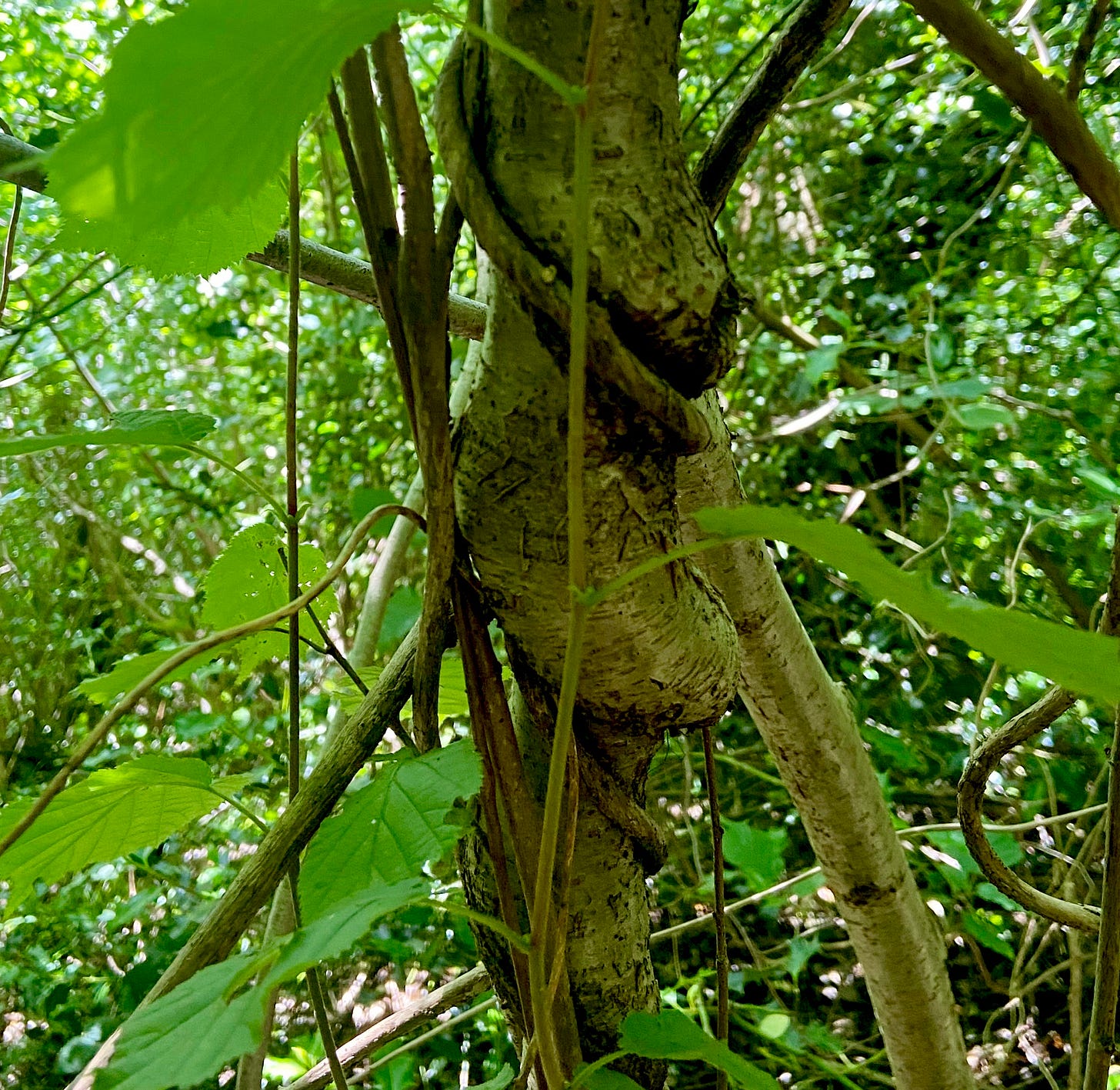
If you have never seen this union, I invite you to look out for it next time you are in a hazel wood. The honeysuckle winds around the pole and the pole continues to grow inside this new binding. Over the years the hazel becomes shaped by it. Spell-bound by honeysuckle, you might say.
Beside my desk I have two beloved hazel staffs, the first with the spiral groove made by honeysuckle; the second forked, creating a perfect nook for the thumb when used as a walking stick.
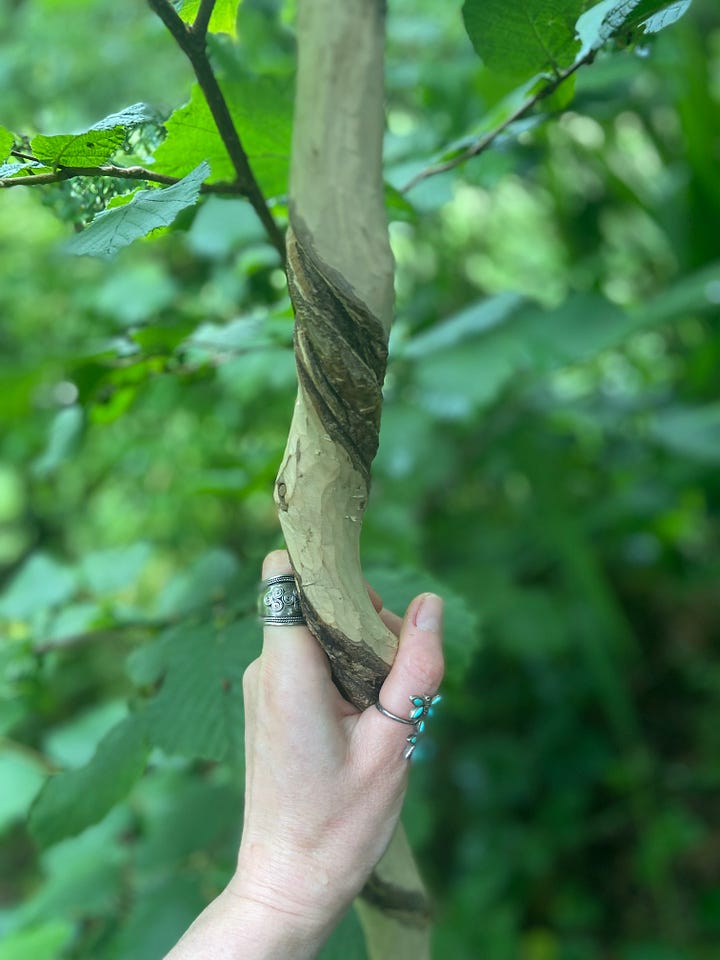
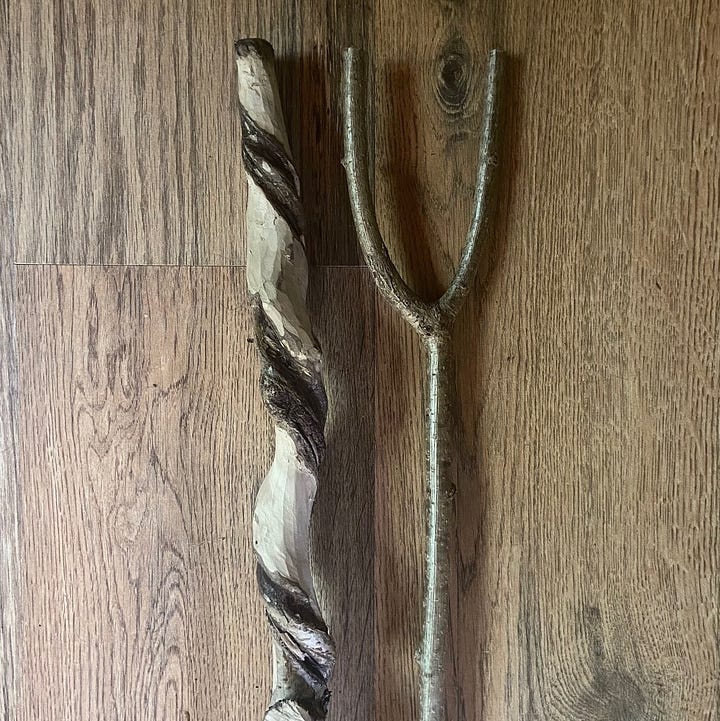
By making staffs of hazel I connect myself to a lineage. Walking sticks and shepherd’s crooks have long been made from these beautifully straight, strong poles. In Celtic folklore hazel is said to be the preferred wood for a wizard (or Druid) staff.
These trees were believed to have magical qualities. They were the guardians of knowledge, and bringers of poetic inspiration. In Irish mythology the hazel stands beside the sacred Well of Wisdom.
That hazel came to have such a sacred place within ancient lore seems fitting to me. How precious hazel would have been to those first people who came north to these lands after the ice receded thousands of years ago. What a gift the nuts, providing so much nourishment, must have been. Not only were they an abundant food, but they could also be stored over winter thanks to the shells, and roasted in the fire embers to enhance their sweetness (I recently very much enjoyed seeing a little pile of ten-thousand-year-old charred hazel nut shells on display in a museum.)
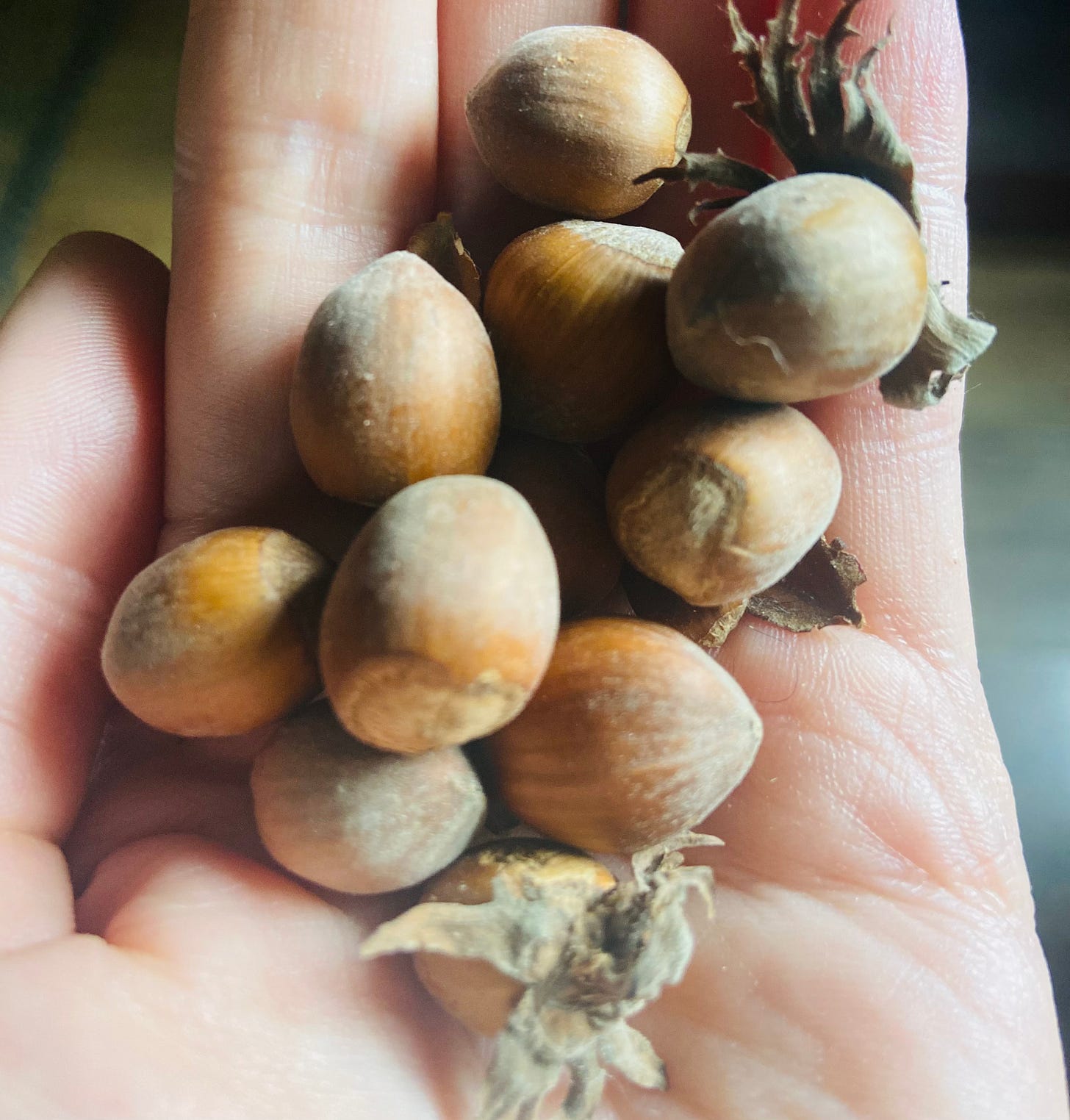
I like to imagine that people of old must also have noticed the beautiful shape created by the union of hazel and honeysuckle, and that they would also have favoured poles shaped in this way for their staffs, both magical and otherwise.
So it was, considering all of this, that the name Hazel Cottage was decided upon: a spell of strength, flexibility, ancient magic, wisdom, poetic inspiration, nourishment & sweetness.
I cannot now imagine calling this cosy hut by any other name.
I am just now distracted by the sight of a blackbird plucking a tiny cherry from a wild cherry tree outside. I love moments like this, which have some mythic quality to them beyond the everyday: the black bird with the deep red cherry clasped in its orange beak.
On that note, I will end this letter here. But I would love to know, which names have a particular resonance for you, and how did you come to choose them?
Also, is there anything that I have touched on so far that you would like to know more about?
As always, I look forward to hearing from you.
With warmest wishes,
Sophie






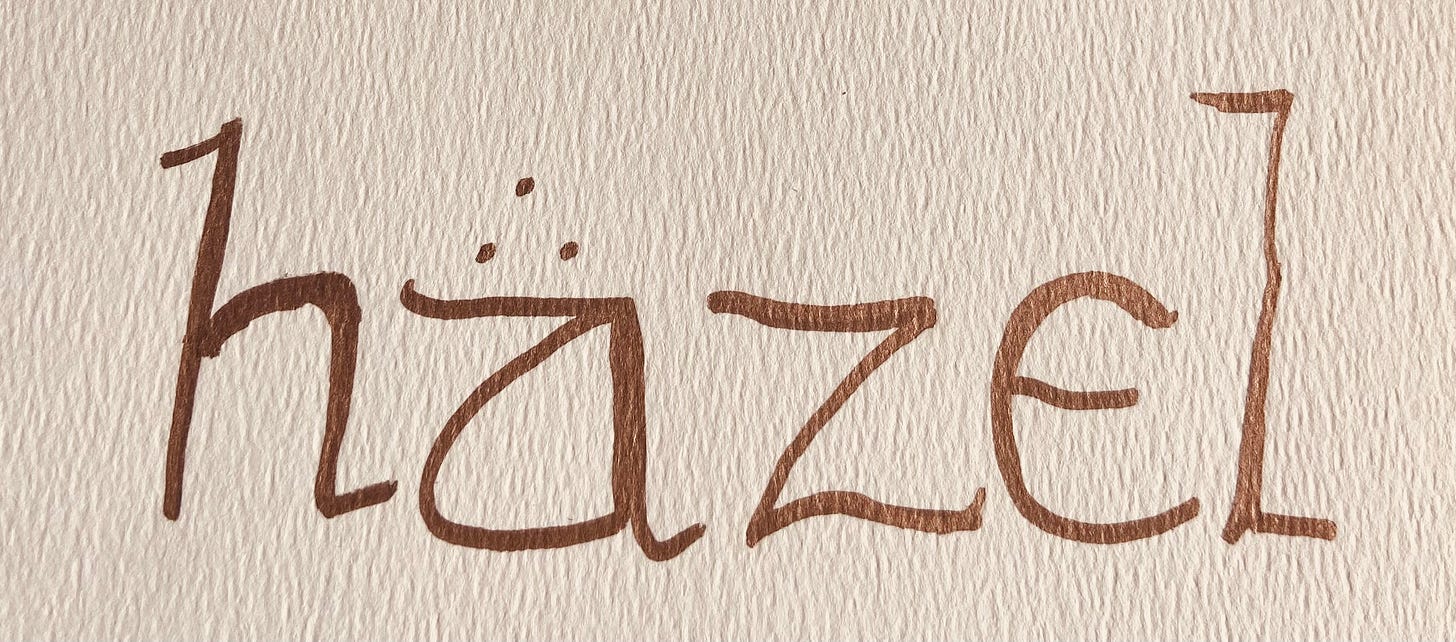
The wren has rendered thoughtfulness
While singing from the hedge
Things don’t always sound
Just how they look she did allege
And her weighted silent letters
Bore down upon my head
Things written but not seen when heard
Might not be found as said
And I couldn’t help but think about
Those words that sometimes rhyme
With a sprinkling of rhythm
Their connections bound in time
And things like whole and hole
How they simply sound the same
With a universe of difference
In the spelling of their names
But there must be more than letters
That come between those two
Letters filled with letters
And double meanings too
Yes! Words are worlds that fall apart
in alphabetic stew
Their meanings bound and parted
By a silent double you.
There is an old myth of a Salmon of knowledge that lived in an unfounded pond (perhaps the well of knowledge) surrounded by 9 Hazel trees said to hold the wisdom of the universe. The salmon is said to have eaten the Hazel nuts that fell from these trees into the pond and thus obtained this knowledge. Fionn then caught and ate the salmon accompanied by an old Druid. I love the story but no one has ever told me why 9 Hazel trees (instead of 7 or 3, equally important numbers) nor whether a salmon would be able to eat nuts. It would probably need a hammer, or a fish fin nut cracker brought from the fish hardware store under the pond. Before you scoff, This is equally possible if the tale itself is possible. I am convinced there is a hardware store of universal knowledge somewhere with all the tools we need to transcend, why wouldn’t a fish find it first? Love the idea of spell - spelling. That will be in my mind for a long time yet. Thanks for the story!